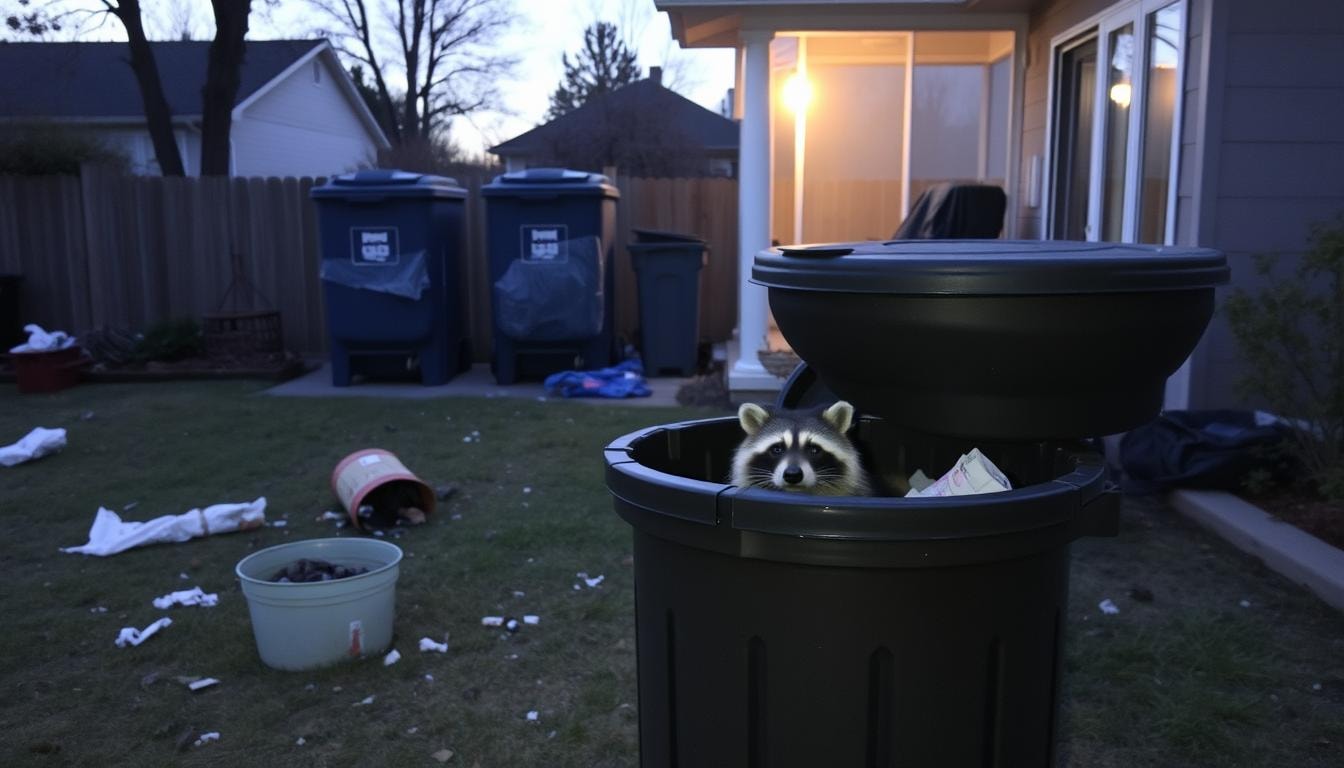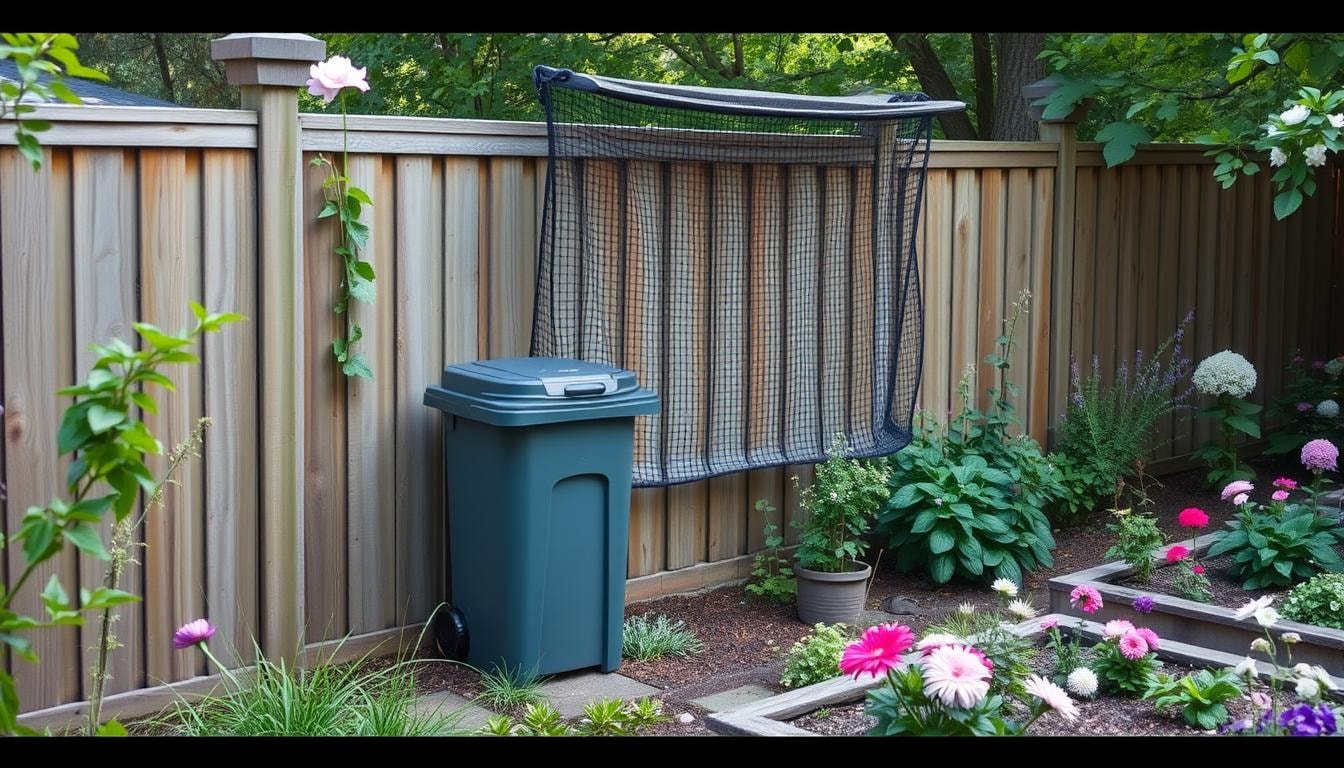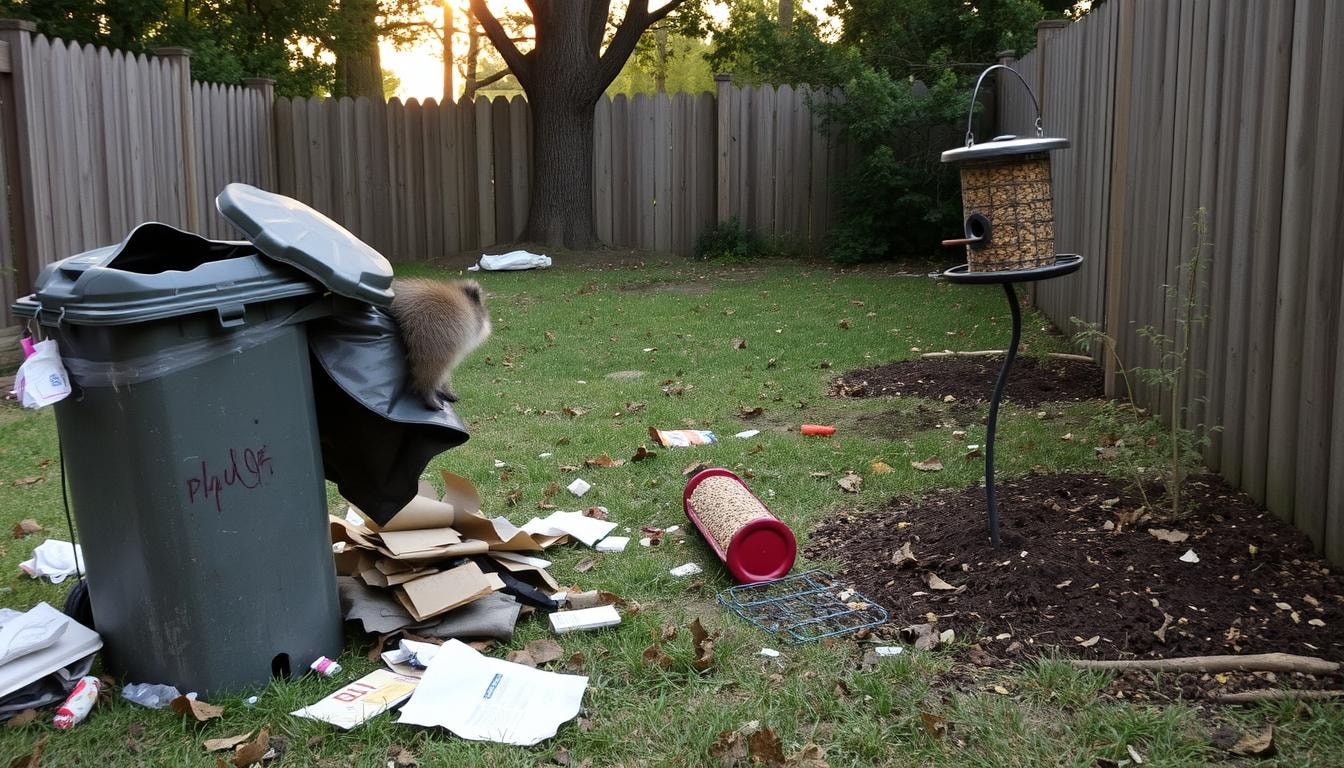Raccoon Removal Near You
Can’t find what you are looking for?
How It Works
-
Answer a few questions about your home project.
-
Within seconds, get matched with top-rated local pros.
-
Compare quotes and choose the best pro for the job.
Raccoon Removal In Your Area
Raccoon Removal: How to Get Rid of Them Safely and Effectively

Key Takeaways
- Raccoons can cause significant damage to your property, including your lawn, garden, and home infrastructure.
- Raccoons can carry and spread diseases that are harmful to both humans and pets, such as rabies and parasitic roundworms.
- Effective raccoon removal requires a combination of prevention, exclusion, and professional assistance in some cases.
- Improper methods, such as using mothballs, can be ineffective and even dangerous when dealing with raccoons.
- Hiring a professional wildlife removal service is often the safest and most efficient way to address a raccoon problem.
Understanding the Raccoon Problem
Raccoons can be cute, but they’re risky when they invade our homes. These clever animals often cause property damage and health concerns. They can access trash, food storage, and even seek shelter in buildings.
Raccoons can chew through siding, roofs, ductwork, and electrical wiring. This behavior leads to costly repairs and potential safety hazards.
Raccoons: Cute but Dangerous
These animals can carry diseases like rabies, roundworm, and canine distemper. They may spread these illnesses to humans or other animals through contact.
Raccoons can be aggressive, especially if they feel threatened or have young nearby. This poses a risk to both people and pets.
Risks and Hazards of Raccoon Infestations
- Property damage: Raccoons can cause up to $2,000 in damage to lawns and gardens annually, and the approximate cost of repairing electrical wires chewed by raccoons can reach $2,500.
- Disease transmission: Raccoon feces can carry the Baylisascaris procyonis parasite, which can be harmful to humans if ingested.
- Aggressive behavior: Raccoons have been known to act aggressively towards people and pets, especially if they feel threatened or have young nearby.
- Rapid population growth: Raccoon populations can increase rapidly if left unchecked due to their adaptability, with nearly 60% of wildlife calls in urban areas concerning raccoon problems.
Knowing these risks is key to addressing raccoon problems effectively. It helps protect your property and family’s well-being.
Signs of a Raccoon Infestation
Spotting raccoon signs is key to solving the problem. You may not see them, but their presence leaves clear marks.
A clear sign is raccoon activity around your trash cans or bird feeders. Raccoons love to dig through trash and enjoy pet food and bird seed.
- Distinctive five-toed footprints measuring around 3-4 inches long are another clear indicator of raccoon presence.
- Claw marks and holes around your home’s exterior, particularly near the roofline, suggest that raccoons have forced their way in.
- Unexplained noises in the attic or crawl space, such as scurrying, scratching, or vocalizations resembling an owl’s whistle, may signal a raccoon nest.
Raccoons differ from skunks or opossums due to their larger size. They also don’t have a strong smell like other wildlife.
Keep an eye out for these raccoon signs and activity. Early detection helps address the issue quickly.
Preventing Raccoon Entry

Keep raccoons away by addressing what attracts them. Seal entry points and remove easy food sources. This makes your home less appealing to these clever critters.
Sealing Entry Points
Raccoons can squeeze through openings as small as 3.5 inches wide. Check your home for gaps around pipes, vents, and where materials meet. Seal these areas with hardware cloth, caulk, or other strong materials.
Eliminating Food Sources
Raccoons love easy food like unsecured trash cans and pet food left outside. Use tight-fitting lids on trash cans and store pet food indoors. Remove bird feeders and treat your lawn to get rid of grubs.
Taking these steps makes your property less attractive to raccoons. This reduces the risk of an infestation. With some effort, you can prevent raccoons from causing damage around your home.
Mothballs: An Ineffective and Dangerous Deterrent
Mothballs are not a safe or lasting solution for raccoon problems. They’re ineffective at keeping raccoons away and can harm people and pets. Mothballs contain toxic substances that pose serious health risks.
These chemicals can cause headaches, nausea, and eye irritation. In severe cases, they may lead to anemia and damage to the liver and kidneys.
The chemicals can contaminate soil and water, endangering the whole community. Mothballs are not an eco-friendly choice for dealing with raccoons. They’ve been proven ineffective against many pests, including raccoons.
Urban raccoons have adapted to living near humans. They’re unlikely to be scared off by bad smells alone. Female raccoons even teach their young to use urban structures for safety.
Mothballs are dangerous and don’t work against raccoons. They also harm the environment. Homeowners should look for safer, more effective ways to handle raccoon problems.
Will Raccoons Leave on Their Own?
Raccoons are clever animals that adapt well to different environments. They stay in areas with food and shelter. The presence of other raccoons also affects how long they remain.
These critters explore their surroundings to find resources. If food is plentiful, raccoons may not want to leave. This can happen even if you try to make the area less appealing.
- Removing food and shelter might make raccoons leave within a week.
- In Florida, raccoons thrive year-round due to warm weather and nearby water bodies. This makes them less likely to leave on their own.
Usually, raccoons won’t go away without intervention. It’s best to take action to remove them. Hiring a professional wildlife removal service is often the safest and most effective solution.
Repairing Raccoon Damage

Assessing and Repairing Raccoon Damage
Raccoons can wreak havoc on your home, damaging siding, roofs, ductwork, and wiring. They may also tear up lawns searching for grubs. A professional should remove raccoons safely and relocate them to a suitable habitat.
After removal, assess the damage and make repairs to prevent future intrusions. Raccoon damage repair costs typically start at $4,000 but can reach tens of thousands. These critters rival termites in causing structural damage.
Homeowner insurance may cover repair costs but usually excludes trapping and removal expenses. Raccoons create communal latrines, causing extensive damage to ceilings, joists, subfloors, and insulation. They also destroy HVAC systems, plumbing, wiring, and vents.
To prevent future infestations, seal entries and repair structural damage. Clean and sanitize affected areas thoroughly. Address root causes to avoid continued problems and more expensive repairs later.
Raccoon Prevention Tips
Keeping raccoons away is key for a safe home. Use exclusion methods and deterrents to make your property less inviting. This helps prevent damage and health risks.
Exclusion Methods
Seal off entry points to your home and structures. Cover attic vents and block access to crawl spaces. Install one-way exits to prevent raccoons from entering and getting trapped.
Secure the space under your deck or porch. This removes potential nesting sites for raccoons.
Deterring Raccoons from Your Property
- Eliminate potential food sources by storing trash cans securely, bringing pet food indoors, and removing bird feeders. Treat your lawn to eliminate grubs that attract raccoons.
- Use deterrents such as bright lighting, loud music, or motion-activated devices to dissuade raccoons from entering your property.
- Consider using natural repellents like ammonia-soaked tennis balls, garlic, or cayenne pepper to deter raccoons.
- Avoid leaving compost piles or accessible water sources that can attract raccoons to your yard.
Use both exclusion methods and deterrents to prevent raccoon infestations. This approach protects your property from these clever pests.
Why Hiring a Professional is Recommended
Dealing with raccoons can be risky, especially if a mother and her young are involved. Trained experts should handle these situations for safety reasons. Raccoons can be aggressive and may carry diseases like rabies.
Professional wildlife removal services have the right tools and knowledge. They can safely capture and relocate raccoons to a better habitat. This ensures the safety of both homeowners and animals.
- Raccoons carry rabies more frequently than other animals, posing risks to homeowners.
- Wildlife removal professionals are skilled at trapping animals rather than killing them, focusing on environmentally friendly and humane practices.
- Pest control experts have specialized tools that can assist in removing animals stuck in high and awkward places.
Hiring a wildlife removal company is often the best solution. These companies are certified and have proper licenses and insurance. They have extensive experience handling various wildlife issues.
The cost of wildlife removal services can vary based on several factors. These include the animal type, removal process complexity, and location. However, professional services are worth the investment for everyone’s safety.
The FindPros Advantage for Raccoon Removal
If you’re dealing with a nuisance raccoon problem, FindPros can connect you with the right animal removal experts to safely and humanely get rid of raccoons on your property. Our network of skilled, licensed professionals can handle everything from trapping baby raccoons to repairing any wildlife damage. With FindPros, you’ll get competitive quotes from top-rated local pros who understand the unique health hazards and entry points associated with raccoons.
Don’t let a growing raccoon population or finding their preferred habitat around your fruit trees, compost bins, or chimney caps turn into a bigger issue. Get a free inspection and let FindPros match you with the ideal service to remove raccoons and prevent them from returning to your home. We make it easy to find the best professional for your raccoon removal needs.
Conclusion
Raccoons can be a big problem for your property and health. You can try to stop them by sealing entry points and removing food sources. Sometimes, it’s best to hire a professional wildlife removal service for safety and effectiveness.
Removing raccoons on your own can be very dangerous. They might attack or spread diseases like rabies, leptospirosis, and salmonella. Raccoons can also carry roundworms that harm humans and pets.
Improper removal can scare raccoons into attics or walls, causing more damage. It’s smart to understand the risks and take action to protect your home.
When unsure, call experts to handle the situation safely. Wildlife control companies have the skills and tools to remove raccoons humanely. They also follow local and national wildlife rules.
Frequently Asked Questions (Raccoon Removal)
MOST POPULAR CITIES
Browse by State- Alameda
- Costa Mesa
- Laguna Beach
- Orange
- Alhambra
- Culver City
- Lancaster
- Oroville
- Anaheim
- Daly City
- Livermore
- Oxnard
- Antioch
- Davis
- Lodi
- Pacific Grove
- Arcadia
- Downey
- Lompoc
- Palm Springs
- Bakersfield
- El Centro
- Long Beach
- Palmdale
- Barstow
- El Cerrito
- Los Angeles
- Palo Alto
- Belmont
- El Monte
- Malibu
- Pasadena
- Berkeley
- Escondido
- Martinez
- Petaluma
- Beverly Hills
- Eureka
- Marysville
- Pomona
- Brea
- Fairfield
- Menlo Park
- Port Hueneme
- Buena Park
- Fontana
- Merced
- Rancho Cucamonga
- Burbank
- Fremont
- Modesto
- Red Bluff
- Calexico
- Fresno
- Monterey
- Redding
- Calistoga
- Fullerton
- Mountain View
- Redlands
- Carlsbad
- Garden Grove
- Napa
- Redondo Beach
- Carmel
- Glendale
- Needles
- Redwood City
- Chico
- Hayward
- Newport Beach
- Richmond
- Chula Vista
- Hollywood
- Norwalk
- Riverside
- Claremont
- Huntington Beach
- Novato
- Roseville
- Compton
- Indio
- Oakland
- Sacramento
- Concord
- Inglewood
- Oceanside
- Salinas
- Corona
- Irvine
- Ojai
- San Bernardino
- Coronado
- La Habra
- Ontario
- San Clemente